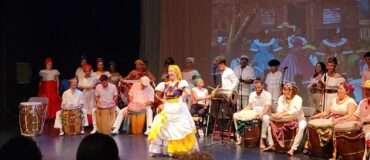By Lacy Molina-Lyon
Lacy Molina-Lyon is a 2024 Archiving and Preservation Fellow with Cashion Cutural Legacy. Read more about the Fellowships here. This is the second part of Lacy’s blog. Read the first part here.
Stepping into the World of Dance Archives
The first several weeks of my Fellowship were a crash course in Cashion Cultural Legacy history and included refining goals and tasks for the summer. As I made my way through the Artistic Director’s files, which would later become their digital archive and the goal of the summer Fellowship, I struggled as an information professional to understand the variation of dance domain specific documents. Thus, reiterating – no two digital archives are identical.
When I brought this concern up to the Cashion staff, they supported me and I began to work closely with Assistant Artistic Director, Alejandro (Alex) Ocampo. He is featured in the photo below standing center stage. Alex is not new to dance but is new to the Cashion staff. His vantage point served the project well, as he understood and communicated the various types of records. Understanding the domain specifications of dance archives is perhaps the biggest learning curve I have encountered thus far. When I accepted the Fellowship position, I knew that this was my weak spot, as I stepped into the Fellowship without dance archive specific experience.
“2018 Tributo – Boda en Chicontepec.” Photograph by Juan Ocampo.
Investigated, taught, and staged by guest instructor Angel Ciro Silvestre García. Debut: Tributo September, 2018. Mexican Heritage Plaza Theater in San José.
I spent hours meticulously analyzing the Artistic Director’s records. These documents provide a rare glimpse into the creative process of a visionary artist. It was like solving a puzzle, and I felt a profound connection to the creative journeys of each performance as well as the organization’s history. Admittedly, it was difficult to stay focused on the task at hand and not get consumed by the history of the organization (although, I did spend time watching the past performances and rehearsal videos). This deepened my appreciation for the intricate details involved in archiving and the importance of context in understanding historical documents. Moreover, I felt a sense of pride as I was able to formalize and create a digital archive for Cashion Cultural Legacy.
I focused my work on terminology and processes that incorporate effective strategies in digital archives, based on my education. But I also left enough wiggle room so the Cashion staff could understand, incorporate, and continue to add to the digital archive even at the conclusion of my fellowship.
Header image: “1976 Mextizol – Prehispanic.” Unknown photographer. Mextizol was the creation of Los Lupeños co-founders Susan Cashion and Ramón Morones. This “choreodrama” which told the story of the mestizo culture debuted in the mid-1970s and toured in a number of iterations in the southwestern states.

Image description: A woman with dark long hair crossing her arms, leaning against a wall, and smiling slightly.
Lacy Molina-Lyon is a doctoral student and research assistant at the College of Information at the University of North Texas. Her research examines information organization in archival records and ethical metadata. Lacy holds a bachelor’s degree in political science and a master’s degree in history. Her love for research, archives, history, and libraries motivated her to pursue a doctorate. Under the direction of Dr. Oksana Zavalina, Lacy is working on her dissertation which seeks to understand applied ethical themes within community oral histories records. As a first-generation college student, Lacy is determined to show other Latinas that it is possible for them to earn advanced graduate degrees. Lacy is also a certified 7th-12th grade English, Language Arts, and Reading teacher and School Librarian in the state of Texas. She is a proud supporter of galleries, libraries, archives, and museums.
Photo credit: Esther Mary Photography
____
We accept submissions on topics relevant to the field: advocacy, artistic issues, arts policy, community building, development, employment, engagement, touring, and other topics that deal with the business of dance. We cannot publish criticism, single-company season announcements, and single-company or single artist profiles. Additionally, we welcome feedback on articles. If you have a topic that you would like to see addressed or feedback, please contact communications@danceusa.org.
Disclaimer: Opinions expressed in guest posts do not necessarily represent the viewpoints of Dance/USA.




